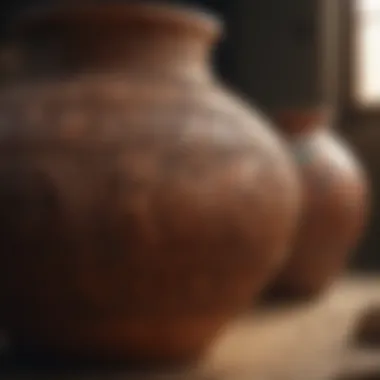Unveiling the World of Native American Artifacts Appraisal Services Nearby


Rock and Fossil Identification
In the realm of Native American artifacts appraisal, understanding the nuances of rock and fossil identification plays a crucial role. Various types of rocks and fossils hold significant historical and cultural value, making it imperative to discern between them accurately. From obsidian to flint, each rock type carries distinct characteristics that experts look for during the appraisal process.
When delving into rock and fossil identification, specialized tools such as magnifying glasses, hardness picks, and streak plates are utilized to scrutinize the texture, color, and composition of these artifacts. These tools aid in identifying key features that differentiate one rock or fossil from another, ensuring a meticulous appraisal process.
Collecting Tips and Techniques
For enthusiasts keen on collecting Native American artifacts, adopting best practices is paramount to preserving the integrity of these cultural pieces. Locating prime collecting sites involves meticulous research and adherence to legal guidelines to respect the historical context of the artifacts.
To extract specimens safely, collectors must be equipped with the necessary tools and knowledge. Implementing proper excavation techniques and documenting the collection process are fundamental aspects of responsible artifact collection.
Preservation and Display
Preserving rocks and fossils is an art in itself, requiring specialized techniques to maintain their longevity and value. From utilizing protective coatings to storing artifacts in controlled environments, preservation methods ensure these historical treasures remain intact for future generations.
While properly storing rocks and fossils in acid-free containers and avoiding exposure to direct sunlight are standard practices, incorporating creative display ideas adds a unique touch to showcasing these artifacts. Strategic lighting and aesthetically pleasing arrangements can elevate the visual impact of displayed collections.
Geological Insights
Bridging the gap between geological science and Native American artifacts, exploring the geological formations that house these treasures unveils a deeper understanding of their historical significance. Geological processes sculpt the landscapes where rocks and fossils are discovered, contributing to the richness of these artifacts' narratives.
Through studying notable discoveries in the field of geology, such as fossils embedded in sedimentary layers or unique rock formations indicative of certain periods, enthusiasts gain insights into the natural history intertwined with Native American artifacts. The geological context provides valuable context to appraisers and collectors alike, enriching the appreciation for these cultural remnants.
Introduction
Native American artifacts hold a profound historical and cultural significance that transcends generations, offering glimpses into the rich tapestry of indigenous communities. This article embarks on a journey to explore the realm of Native American artifacts appraisal services available in proximity to enthusiasts seeking to unveil the value locked within these treasures. By shedding light on the essence of evaluating these artifacts, individuals can deepen their understanding of the cultural heritage encapsulated within them.
Understanding Native American Artifacts
Types of Native American Artifacts


Native American artifacts encompass a diverse array of objects crafted by indigenous tribes across the Americas. From intricately designed pottery to meticulously fashioned tools and ceremonial objects, each artifact tells a story of ancient craftsmanship and societal customs. The intricate beadwork of Native American jewelry or the exquisite pottery pieces exemplify the artistry and skill embedded within these artifacts. Their versatility and cultural significance make them invaluable additions to historical collections and museums, showcasing the ingenuity and creativity of indigenous artisans.
Significance of Native American Artifacts
The significance of Native American artifacts transcends mere material value, extending into realms of cultural preservation and historical understanding. These artifacts serve as tangible links to ancestral traditions, offering insights into tribal beliefs, daily life practices, and artistic expressions. By delving into the significance of these artifacts, one can appreciate the resilience and creativity of indigenous communities throughout history. Their preservation not only honors the past but also paves the way for future generations to cherish and learn from the diverse heritage embedded within these objects.
Importance of Appraisal
The significance of appraising Native American artifacts cannot be overstated, as it plays a pivotal role in preserving history and cultural heritage. In this article, we delve deep into the crucial aspects that make appraisal services essential for anyone interested in understanding the value and authenticity of these historical treasures. Through the appraisal process, individuals gain insight into the cultural significance and historical context of each artifact, contributing to a more comprehensive understanding of Native American heritage.
Preservation of History
Ensuring Cultural Heritage
Ensuring cultural heritage through artifact appraisal involves safeguarding the legacy and traditions of Native American communities. By evaluating these artifacts, we not only preserve tangible objects but also the intangible cultural practices and beliefs they represent. This process ensures that the rich cultural heritage of Native American tribes is documented and protected for future generations to appreciate and learn from. One of the key characteristics of ensuring cultural heritage is its ability to bridge the past with the present, creating a continuous narrative of identity and connection to history. This approach is invaluable in shedding light on indigenous perspectives and narratives that enrich our collective understanding of American history.
Legal Significance
The legal significance of artifact appraisal provides a framework for ensuring compliance with regulatory requirements and ethical standards. By understanding the legal aspects of artifact appraisal, individuals can navigate potential challenges such as provenance issues, ownership disputes, and compliance with laws related to cultural property. This aspect of appraisal promotes transparency and accountability in the acquisition and ownership of Native American artifacts, preventing the illicit trade and exploitation of cultural heritage. While the legal significance of appraisal imposes certain limitations and obligations, it ultimately serves to protect the integrity and cultural significance of these artifacts in a manner that upholds ethical standards and respects indigenous rights and sovereignty.
Finding Appraisal Services
In this section of the article, we will delve into the crucial aspect of Finding Appraisal Services, which plays a central role in guiding individuals interested in assessing the value of Native American artifacts. The process of finding reputable appraisal services holds immense significance as it ensures a thorough and accurate evaluation of these historical treasures. By exploring this topic, readers will gain valuable insights into the steps necessary to connect with professional appraisers and receive expert guidance on the authenticity and value of their artifacts.
Researching Local Appraisers
Local Museums and Historical Societies
When it comes to researching local appraisers, turning to Local Museums and Historical Societies stands out as a notable choice. These institutions possess a wealth of knowledge and expertise in Native American artifacts, making them ideal partners in the appraisal process. Local Museums and Historical Societies offer a unique advantage due to their specialized focus on preserving and showcasing cultural heritage. By engaging with these entities, individuals can tap into a network of curators and historians dedicated to upholding the legacy of Native American artifacts. While the main benefit lies in the in-depth understanding these organizations bring to the appraisal table, a potential downside may be the limited availability of appraisers within such establishments, which could influence the appraisal timeline.
Online Resources
Alternatively, Online Resources serve as a valuable avenue for identifying local appraisers and expanding one's appraisal options. Online platforms provide a convenient and accessible way to connect with a diverse pool of appraisers specializing in Native American artifacts. The key advantage of utilizing Online Resources lies in the vast array of choices available to individuals seeking appraisal services, empowering them to select appraisers based on their specific needs and preferences. Moreover, online databases and forums enable users to access reviews and feedback from previous clients, offering essential insights into the reputation and expertise of appraisers. However, a potential drawback of relying solely on online resources may be the difficulty in verifying the credibility and accreditation of appraisers, underscoring the importance of conducting thorough research and due diligence.


By exploring the avenues of Local Museums and Historical Societies as well as Online Resources for researching local appraisers, individuals can navigate the appraisal process effectively, ensuring a comprehensive evaluation of their Native American artifacts. These insights not only enhance the readers' understanding of Finding Appraisal Services but also empower them to make informed decisions when seeking appraisal assistance.
Choosing a Reputable Appraiser
When delving into the world of Native American artifacts, selecting a reputable appraiser is paramount. The importance of this topic within the broader context of exploring appraisal services near you cannot be overstated. Choosing a reputable appraiser ensures accuracy, integrity, and reliability in the appraisal process. With the intricate nature of Native American artifacts, having an expert appraiser with the right credentials and experience becomes crucial to obtaining a thorough and accurate assessment.
Credentials and Experience
Certifications and Licenses
Certifications and licenses play a vital role in establishing the credibility and expertise of an appraiser. In the realm of Native American artifacts, possessing relevant certifications and licenses underscores an individual's commitment to professionalism and adherence to industry standards. Customers can trust the valuation provided by a certified appraiser, knowing that it meets recognized guidelines and ethical practices. The unique feature of certifications and licenses lies in the assurance they offer regarding the appraiser's qualifications, thereby instilling confidence in the appraisal process.
Specialization in Native American Artifacts
Specialization in Native American artifacts signifies in-depth knowledge and experience in evaluating these specific types of historical items. Choosing an appraiser with a specialization in Native American artifacts ensures a nuanced understanding of the cultural and historical significance encompassed by such pieces. The appraiser's focus on this niche area enhances their ability to recognize unique features, determine authenticity, and provide insightful valuations. By opting for an appraiser with expertise in Native American artifacts, individuals can expect a comprehensive appraisal that considers both the intrinsic and extrinsic value of these culturally significant items, elevating the appraisal process to a more profound and insightful level.
Appraisal Process
In the realm of Native American artifacts, the Appraisal Process takes center stage, embodying a crucial step in accurately evaluating these historical treasures. This section delves into the intricate procedures involved in appraising Native American artifacts near enthusiasts seeking to uncover the true worth of these cultural relics.
The significance of the Appraisal Process lies in its ability to provide individuals with a comprehensive understanding of the value, authenticity, and historical context of Native American artifacts. By engaging in this process, collectors and enthusiasts alike can gain insights into the provenance, rarity, and cultural significance of each artifact, enhancing their appreciation and knowledge of these valuable pieces of heritage.
Moreover, the Appraisal Process serves as a safeguard against counterfeit or misrepresented artifacts, ensuring that only genuine pieces are recognized and preserved for future generations. By relying on expert appraisers trained in the nuances of Native American artifacts, collectors can make informed decisions regarding their acquisitions or contributions to historical archives.
Throughout this article, the Appraisal Process acts as a guiding light, leading individuals through the intricate world of appraising Native American artifacts and shedding light on the significance of preserving these cultural gems.
Evaluation Criteria
Authenticity and Provenance
Delving into the Evaluation Criteria of Native American artifacts, Authenticity and Provenance stand out as paramount considerations in determining the true value and historical importance of these cherished objects. Authenticity refers to the genuineness of an artifact, ensuring that it is not a modern reproduction or forgery created to deceive collectors.


The Provenance, on the other hand, traces the artifact's documented history, establishing its origin, previous owners, and historical significance. By scrutinizing and verifying both the authenticity and provenance of an artifact, experts can validate its cultural heritage and ensure its place within the historical narrative of Native American communities.
Authenticity and Provenance serve as beacons of trust and integrity in the appraisal process, offering collectors the assurance that the artifacts they possess or seek to acquire hold true historical value and cultural significance.
Condition and Rarity
In the evaluation of Native American artifacts, Condition and Rarity play crucial roles in determining their overall worth and importance. The Condition of an artifact refers to its physical state, including any damage, wear, or restoration, which can significantly impact its value and collectability.
Rarity, on the other hand, defines the scarcity or uniqueness of an artifact within the cultural and historical context of Native American craftsmanship. Rare artifacts hold a special allure for collectors due to their limited availability and unique characteristics, making them highly sought-after pieces in the realm of artifact appraisal.
By assessing both the Condition and Rarity of an artifact, appraisers can offer valuable insights into its historical significance, market desirability, and conservation requirements, guiding collectors in making informed decisions regarding the preservation and appreciation of these cultural treasures.
Cost of Appraisal
When delving into the realm of exploring Native American artifacts appraisal, understanding the cost of appraisal holds significant importance. The pricing structure plays a crucial role in determining the value and authenticity of these historical treasures. Evaluating the cost of appraisal not only provides insight into the financial investment required but also ensures a fair assessment of the artifact's worth.
Factors Influencing Pricing
Complexity of Artifact
At the core of the appraisal process lies the complexity of the artifact being evaluated. The intricacy and uniqueness of each Native American artifact directly impact its appraisal value. Factors such as craftsmanship, materials used, rarity, and historical significance all contribute to the complexity of an artifact. The more intricate or rare an artifact is, the higher its appraisal cost is likely to be. Artifacts with intricate detailing or exceptional craftsmanship often command a higher appraisal fee due to the expertise and time required for assessment.
Appraiser's Expertise
Another crucial aspect influencing the pricing of Native American artifacts appraisal is the expertise of the appraiser. An appraiser's expertise in evaluating and authenticating these artifacts is invaluable. Appraisers with specialized knowledge and experience in Native American artifacts are better equipped to provide accurate assessments of value. Their expertise not only ensures a thorough evaluation but also adds credibility to the entire appraisal process. However, the level of expertise comes at a cost, with highly skilled and knowledgeable appraisers typically commanding higher fees for their services.
Conclusion
The exploration of Native American artifacts appraisal near you in this article illuminates a crucial aspect of preserving history and culture. Understanding the significance of evaluating these historical treasures not only honors the past but also sheds light on the rich heritage of indigenous communities. By delving into appraisal services, individuals gain insights into the value and importance of these artifacts beyond their monetary worth. Through reputable appraisal services, a comprehensive assessment of Native American artifacts ensures their preservation for future generations.
Ensuring Preservation and Recognition
Invaluable Contributions of Appraisal:
Appraisal plays a pivotal role in the preservation and recognition of Native American heritage. The meticulous assessment provided by expert appraisers adds credibility and authenticity to these artifacts, serving as a crucial step in safeguarding their history. The invaluable contributions of appraisal lie in its ability to uncover the true worth of these cultural relics, providing a platform for appreciation and acknowledgment within the wider community. The detailed evaluation offered by experienced appraisers enhances the historical context of these artifacts, amplifying their significance and fostering a deeper understanding of Native American heritage.
Celebrating Native American Heritage:
Celebration of Native American heritage through the appraisal process is a testament to the enduring legacy of indigenous cultures. By recognizing the artistic, spiritual, and historical value embedded in these artifacts, appraisal services not only honor the craftsmanship of Native American artisans but also commemorate their stories and traditions. Celebrating Native American heritage through the appraisal of artifacts serves as a way to connect with the past, bridging the gap between generations and ensuring the continued reverence for these cultural treasures. The meticulous examination of artifacts allows for a nuanced exploration of Native American heritage, fostering a sense of pride and cultural appreciation among enthusiasts and collectors.







